Bonaparte and Nelson: on the way to Abukir
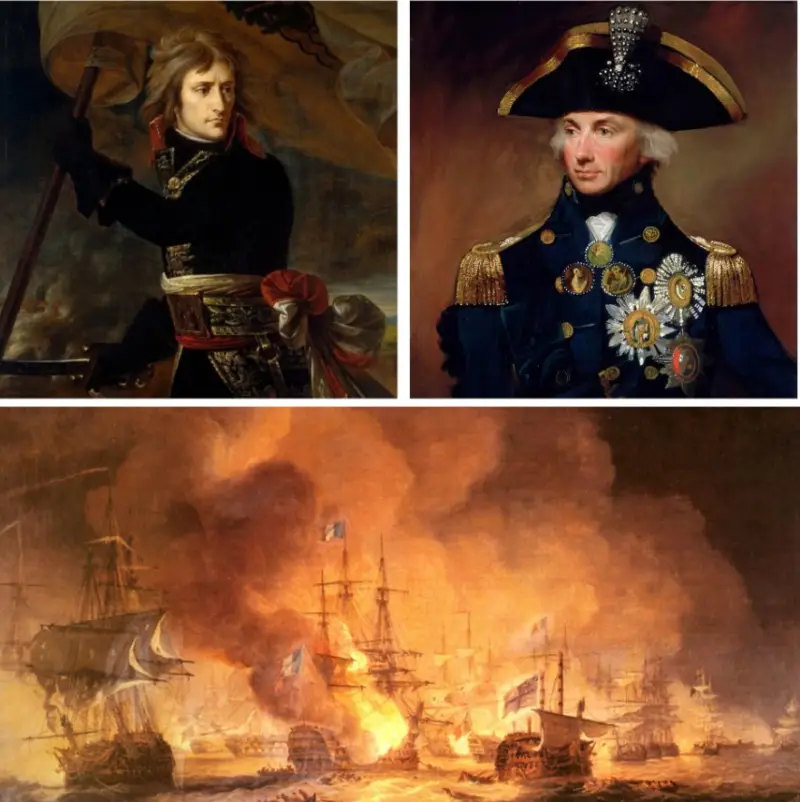
The great career of Napoleon Bonaparte, as is known, began in December 1793, when, after the liberation of Toulon, he, being only a captain, received his first general rank. In August 1794, Bonaparte was arrested on suspicion of connections with Auguste Robespierre (Maximilian's brother), but was released after 14 days. A new rise followed in October 1795 after the defeat of the Royalist rebellion in Paris. Bonaparte himself then said to his friend Junot:
However, his enemies later called him “General Vendomière” for a long time.
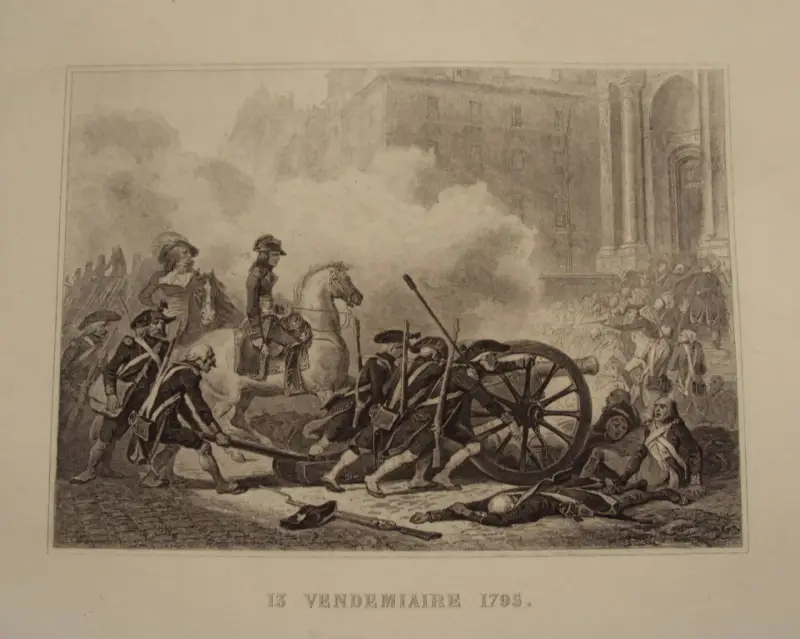
Bonaparte 13 Vendomière 1795
In 1796–1797, Napoleon conducted a brilliant military campaign in Italy and was enthusiastically received in Paris.
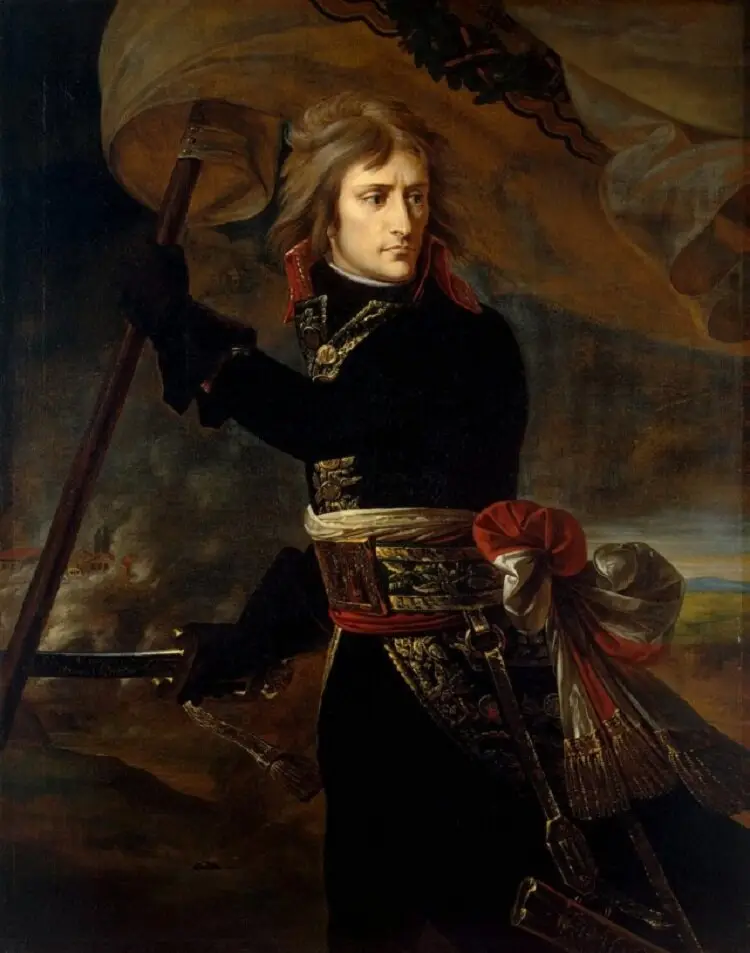
Antoine-Jean Gros. Napoleon Bonaparte on the Arcole Bridge
But the members of the Directory did not really like his popularity, since their authority at that time was already approaching zero, and they feared a military coup that could be led by this ambitious young general. Fortunately for them, Bonaparte himself could not sit in the capital and sought to leave Paris to lead the army in some new war - Talleyrand later said that
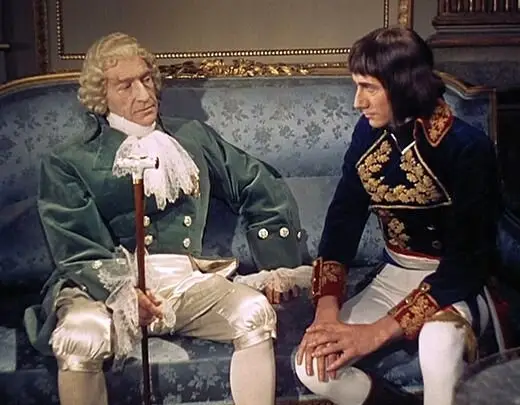
Talleyrand and Bonaparte. Still from the French film Napoleon, 1954.
Bonaparte's big plans
Napoleon's gaze turned to Egypt. And, it must be said that his plans did not seem to anyone then an absurd and hopeless adventure. Even during the time of Louis XIV, Leibniz presented a report on the need to conquer Egypt. And Talleyrand, in his “Memoir on the Advantages of New Colonies in Modern Conditions” dated July 3, 1797, pointed to Egypt as a very promising direction for compensating for the colonial losses suffered by France.
Egypt belonged to the Ottoman Empire, which was already entering its decline, and thoughts about dividing the “Turkish inheritance” came to the minds of many European politicians. Egypt at that time was actually ruled by Mamluk sultans and beys. Mamluks (literally translated from Arabic as “white slaves”) were once brought to Egypt as guards of the last Egyptian rulers from the Ayyubid dynasty (1171–1250).
These were Turkic and Caucasian warriors who were captured by the Mongols and bought by the Egyptian rulers. And also – boys of the same nationalities from which warriors were trained directly in Egypt. In 1250, the Mamluks overthrew Turan Shah and seized power in the country. In 1260, at the Battle of Ain Jalut, they even defeated the Mongols.
The most famous Mamluk ruler of Egypt was the famous Baybars, who conquered Caesarea, Arsuf, Acre, Safed, Byblos, Toron, Antioch, Beaufort, Krak des Chevaliers, and Beaufort from the Christians. During the battles with the crusaders of the Seventh Campaign, he captured the King of France, Louis IX the Saint, and his brother Alphonse; another brother of the French king, Robert d'Artois, was killed at El Mansur. But now the Mamluk troops could not provide serious resistance to the French army of the New Age, and even led by the great commander Bonaparte.
The merchants and industrialists of Southern France were enthusiastic about the plans to conquer Egypt. In general, Bonaparte’s plans suited everyone, and therefore he was given carte blanche to prepare an army and fleet to a new campaign. In Toulon and other Mediterranean ports, 13 battleships, 6 frigates, 23 corvettes and sloops, and hundreds of transport ships were preparing for the campaign. The flagship of this fleet was the 124-gun, three-decker battleship L'Orient ("East"). The command of the fleet was entrusted to 45-year-old Vice Admiral Francois-Paul Bruet d'Aigallier.
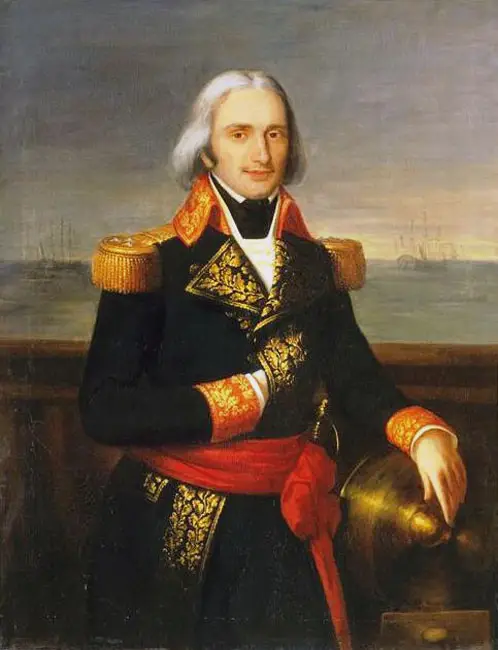
François-Paul Bruet d'Aigallier in a portrait by an unknown artist
The number of ground forces reached 38 thousand people.
Napoleon did not intend to limit himself to Egypt alone; he made plans for further movement to the East - to India. As you know, later he warmly supported the idea of the Indian campaign, in which the 35-strong French army of Andre Massena was supposed to go with the allied Russian troops.
British concerns
It was impossible to keep such large-scale preparations of the French army and navy secret. The British, who had been at war with revolutionary France since 1793, were very alarmed because they did not know where the young, but very talented and dangerous commander Napoleon Bonaparte would direct his attack. They did not rule out the possibility of attempting to land troops on the English or Irish coasts. Indeed, at the end of 1796 - beginning of 1797. Generals Gauche and Grouchy had already tried to land troops in Ireland, but a storm separated the French ships.
Among those ships that nevertheless managed to come to the place of the intended landing, there was no ship of a more determined Ghosh. Admiral Bouvet categorically objected to the continuation of the operation, and Grouchy did not dare give the order to begin the landing. The French then only ingloriously lost 12 ships, including the 74-gun Droits de l'Homme.
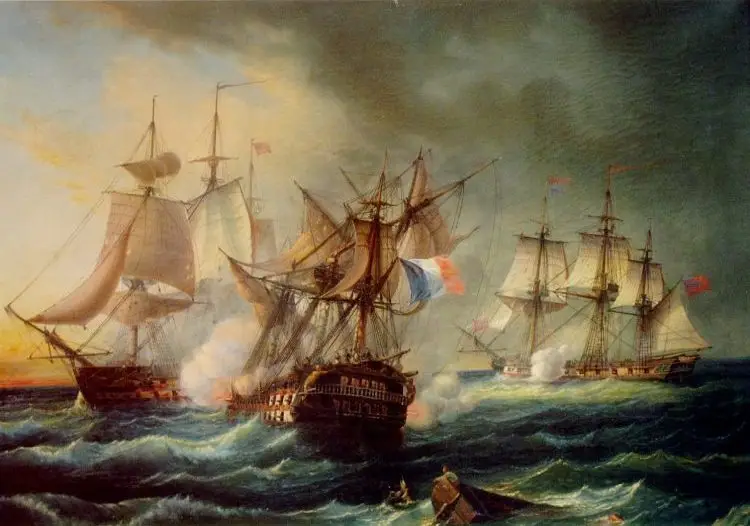
Leopold Le Guen. Battle between the French ship of the line Droits de l'Homme and the frigates HMS Amazon and Indefatigable, 13 and 14 January 1797
Let us note that in 1798, about two thousand French soldiers nevertheless landed in Ireland, but were unable to build on their success and gain a foothold.
Things were far from brilliant for the British. By the end of 1797, the war of the First Coalition was lost: Prussia, Spain and Holland stopped fighting; moreover, at the end of 1796, Spain, defeated by the French, entered the war against the British - and this war ended only in 1808. Bonaparte defeated the Austrians in Italy and abolished the Venetian Republic. The Ionian Islands came under French control. France annexed Belgium and the Rhineland.
And now - new military preparations for the restless Bonaparte. On May 8, 1798, a small squadron of three battleships and a brig was sent to Toulon to observe the French fleet. Command was entrusted to Horatio Nelson.
Admiral Nelson
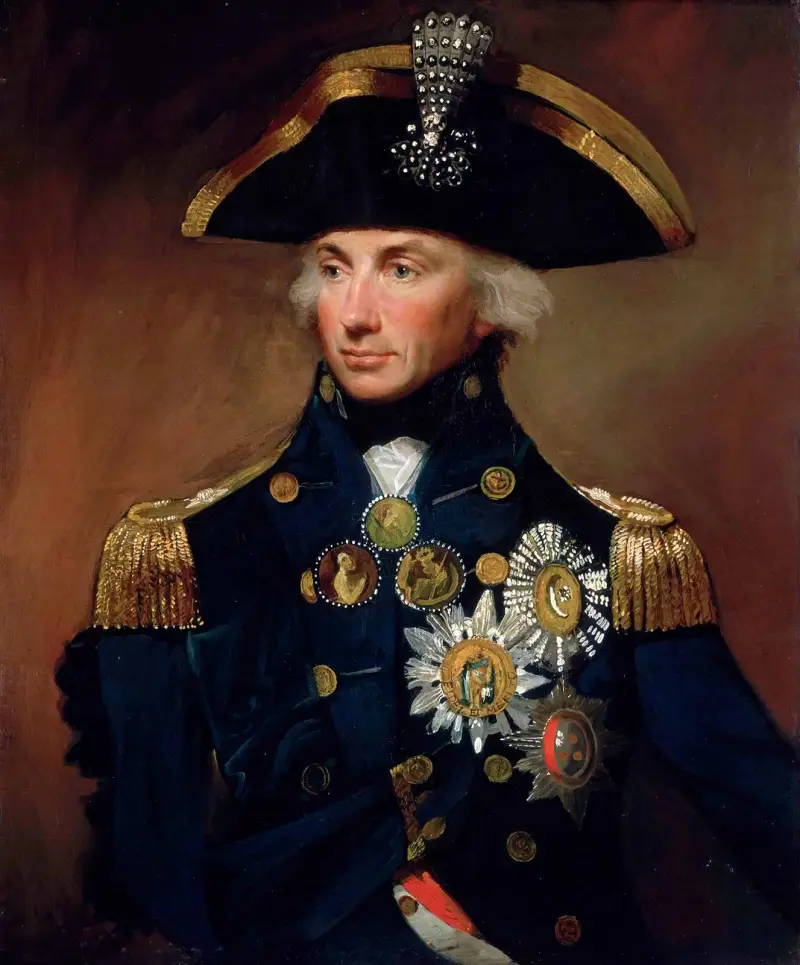
Horatio Nelson in a portrait by Lemuel Francis Abbott, 1799
Three generations of men in the family of this famous admiral were priests (in the Anglican Church, clergy have the right to marry), and he himself was of a very puny build, and besides, he was also prone to seasickness. The description given to him by officials of the maritime department said:
Nelson had been fighting the French since 1794, initially under the command of Admiral Hotam. During the siege of the Corsican city, Calvi was wounded in the right eye. On March 13–14, 1795, commanding the battleship Agamemnon, he took part in the victorious battle for the British in the Gulf of Genoa. In November 1795, Nelson led a small detached squadron of British ships.
At the end of 1796, after Spain entered the war, he was tasked with evacuating British troops from the island of Elba. In 1797, Nelson was the commander of the battleship Captain, which took part in a naval battle against the Spanish fleet off Cape St. Vincent (southwest coast of Portugal). The English squadron was commanded by the talented admiral John Jarvis.
During this battle, a maneuver called the “Nelson Bridge” was used for the first time: during boarding, his subordinates captured Spanish ships, moving from one enemy ship to another. Nelson then personally participated in hand-to-hand combat. After the victory, he received the rank of rear admiral of the Blue Flag (or Blue Squadron, at that time the third senior rank after admiral of the fleet and admiral of the White Squadron), became a knight of the Order of the Bath - and only now received the title of nobility.
However, in July 1797, he failed in an attempt to attack the city of Santa Cruz on the island of Tenerife and was wounded by grapeshot in the elbow joint of his right arm, which led to amputation. The crippled admiral was sent into retirement with a pension of one thousand pounds sterling a year. However, a month later he turned to Jarvis with a request to return to service. And now he had to engage in battle with the French ships at Abukir.
Admiral Nelson's Hunt
So the British didn't know where the French fleet would go. The most insightful was Secretary of War Henry Dundas, who suggested that Egypt might be the French target. But other members of the British Cabinet laughed at him, advising him to think, “holding a map in your hands and counting distances.”
The most likely directions for a French attack were considered to be Ireland, Portugal, Sicily or Naples. As we remember, Nelson's squadron was sent to monitor the French fleet to Toulon. These ships went to sea on May 8, 1798, but 4 days later they were caught in a strong storm and received such significant damage that they had to be taken to the island of Sardinia for repairs. On May 19, 1798, the French fleet had already set out on its voyage, and Nelson’s ships left Sardinia only on May 27.
On 7 June, Vice Admiral St. Vincent, commander of the British Mediterranean Fleet, allocated 11 more battleships to Nelson, ordering him to find the French fleet "to capture, sink, burn or destroy it."
The disadvantage of Nelson's squadron was its lack of frigates. These fast ships were then widely used for reconnaissance raids; they were even called “the eyes and ears of the fleet” - and, according to some sources, it was Nelson who gave them this definition. But then Nelson turned out to be “blind and deaf,” and therefore he could not find the French fleet for a very long time.
Fall of Malta
On June 10, 1795, the French fleet reached the shores of proud Malta, where the impregnable citadel of the Knights Hospitaller was located - La Valette. As early as September 19, 1792, the revolutionary government of France confiscated all property of the Order of Malta in that country. Now the ancient Order of the Hospitallers received an almost mortal wound from Bonaparte.
Napoleon desperately bluffed, demanding surrender - he was in a hurry to get to Egypt, and he did not have time; British warships could approach the island at any moment. And the fortress of La Valletta, with 1 cannons on its walls, was really good. The French general Caffarelli, who examined it from the inside, was amazed at the perfection of this citadel and declared:
But Grand Master Ferdinand von Gompesch openly chickened out and signed an act of surrender on June 12: Malta came under the sovereignty of France, and the knights had to leave the island within three days. Later, Gompesh justified himself by saying that, according to the rules of the order, it is impossible to raise weapon on Christians.
He either forgot about the order’s wars with the Byzantines, or, like many Catholics, did not consider them true Christians. The French also appropriated the order's treasury, which contained valuables worth a huge amount of 30 million lire.
The fall of Malta had enormous consequences. On August 26, 1798, in the “Castle of the Knights of Malta” on Sadovaya Street in St. Petersburg, the Knights of the Grand Priory of Russia officially condemned Gompesh for capitulation and declared him deposed from the post of Grand Master.
At the same time, it was decided to transfer the Order of the Hospitallers under the patronage and patronage of the Russian Emperor Paul I. On September 10 of the same year, Paul I granted the request of the Johannites, on October 27 he was proclaimed Grand Master of the Jerusalem Order of St. John (72nd in a row), on November 13 the Emperor announced his agreement to accept this title. St. Petersburg became the headquarters of the Order of Malta; the President of the Academy of Sciences, Baron Nikolai, was instructed to designate the island of Malta as a “province of the Russian Empire” in the published calendar.
A practically impregnable island as a base for the Russian fleet in the Mediterranean Sea - this was, of course, a very strong decision. The Grand Priories of Germany, Bavaria, Bohemia, Naples, Sicily, Venice, Portugal, Lombardy and Pisa recognized Paul I as Grand Master. The priors of Catalonia, Navarre, Aragon, Castile and Rome refused to obey - and this was very short-sighted on their part, since only the Russian emperor could now guarantee a dignified existence for the order.
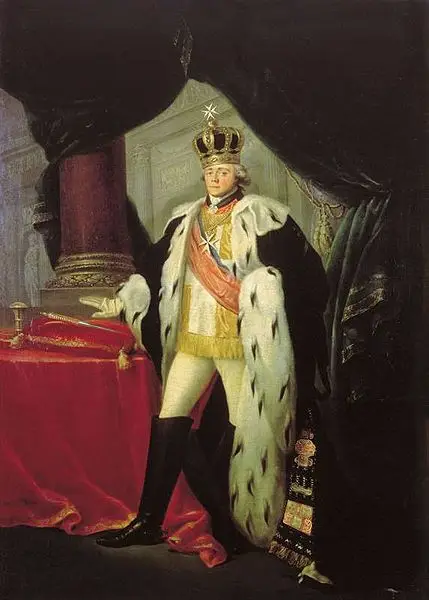
Paul I in the dress of the Grand Master of the Order of Malta. Portrait work S. Tonchi. 1798 – 1801. Russian Museum (St. Petersburg)
Looking ahead, let's say that on September 5, 1800, a small French garrison surrendered Malta to the British, who refused to return this island to its rightful owner - the Grand Master of the Hospitallers, Paul I.
The Russian emperor was deeply offended by such treachery of his hypocritical allies: Russia withdrew from the second anti-French coalition, and soon a rapprochement between Paul I and Napoleon began. After the murder of Paul, his son Alexander, who came to power with the help of the British, renounced his rights to Malta, which at that moment was already considered a Russian province, and handed it over to Britain without any conditions.
But the Johannite Order still survived, and currently has more than 10 thousand members - second only to the Jesuits in number.
On Rome's Via Condotti you can see the Palazzo di Malta - this is the territory of a sovereign state (with an area of 0,012 sq. km), which is recognized by 105 countries and has the right to issue its own passports, issue stamps and mint coins.
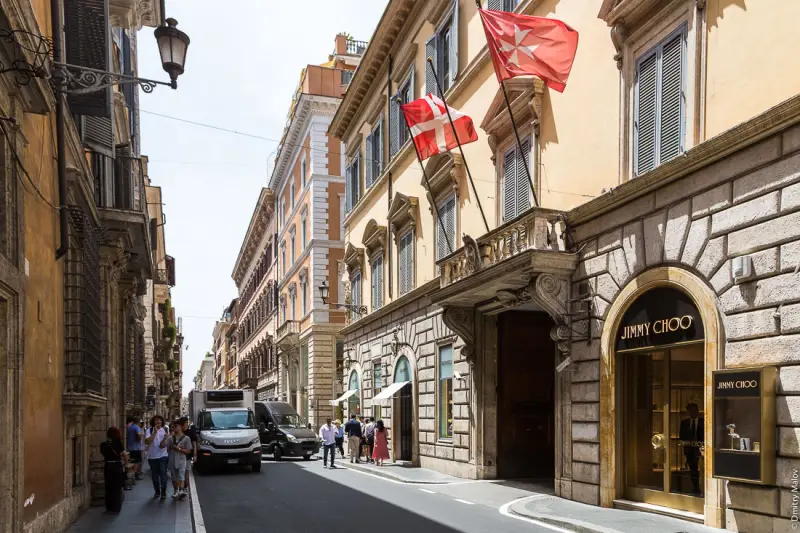
Building on Via Condotti
The official languages of this state are Latin and Italian, but this is what the full title of its head sounds like:
In addition, the current Humble Masters, having the rank of cardinal and prince of the royal blood, enjoy simultaneously the titles of Primacy (in Russian it is most often translated as “Eminence”) and Highness. The Master should be addressed as: Your Most Excellent Highness.
The Order of the Ioannites now has 6 main priories (Rome, Venice, Sicily, Austria, Czech Republic, England) and 54 national commanderies (including in Russia). Hospitallers now receive their income from the sale of postage stamps and various souvenirs, as well as in the form of donations from individuals. In 1992, Russia and the Johannite Order restored diplomatic relations; the post of ambassador is shared by the representative of the Russian Federation to the Vatican.
Continuation of the voyage of the French ships
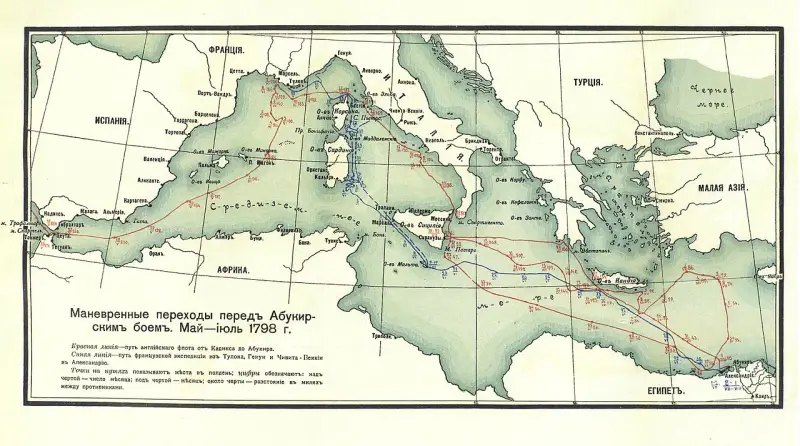
The route of the French and English fleets to Abukir on the map of 1911.
Let's return to the Mediterranean in June 1798.
On June 19, the French fleet left Malta and headed for Alexandria, but not directly, but rounding Crete - in order to deceive the British. As a precaution, all merchant ships encountered along the way were captured along the way. Nelson, in search of the enemy fleet, went to Corsica, then to Sicily. Here, in the Strait of Messina, on June 20, from the captain of the Genoese ship he met, he learned about the capture of Malta by the French, and also that they had already left this island. The English admiral decided to look for the enemy fleet near Crete.
On the foggy night of June 22–23, the enemy squadrons passed within just a few miles of each other, and the French heard the signal guns of British ships firing. Nelson then headed towards Alexandria, but reached this city too quickly - on June 28. The Ottoman governor of Alexandria declared that Turkey would remain neutral and prohibited entry to the raid.
On the morning of June 29, the British left Alexandria. And on the night of June 29-30, the fleet of Admiral Francois-Paul Bruet approached Alexandria. Nelson at this time was leading his ships to Anatolia, from which he turned to the island of Corfu. Later, explaining the long search for the French fleet, he quoted an English proverb: “The children of the devil always have the devil’s luck.”
French landing in Alexandria
So, Nelson failed to prevent the movement of the enemy fleet, and on the night of June 30, 1785, the French approached Alexandria. The French poet Nicholas Turk, who took part in this expedition, recalled:
On July 2, the city was captured, then troops were landed in great haste over several days, and more than 20 French soldiers drowned. Wasting no time, Napoleon led the army south and, even before Nelson’s squadron appeared, defeated the Mamluks at the Battle of the Pyramids.
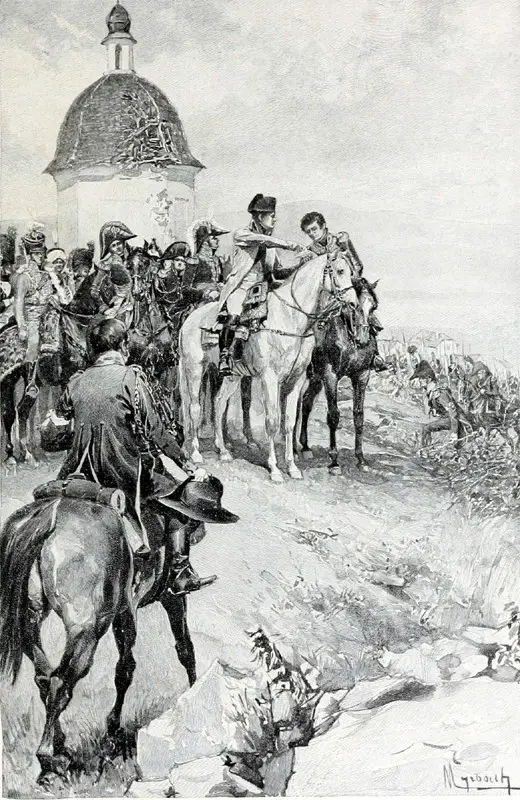
Felician Mirbach-Reinfeld. Napoleon in Egypt
Abukir
But now the question arose about the deployment of French ships. Bonaparte gave very reasonable orders to place them in the harbor of Alexandria or take them to the island of Corfu. The depth of the sea in Alexandria was not sufficient for large ships, but this problem could be solved by blowing up several pitfalls; French sappers assured that this was possible. In addition, in addition to the Great Bay, in the harbor of Alexandria there was the port of Eunost (“Happy Return”), French battleships could easily enter it, and a battery of heavy cannons could be installed on Pharos.
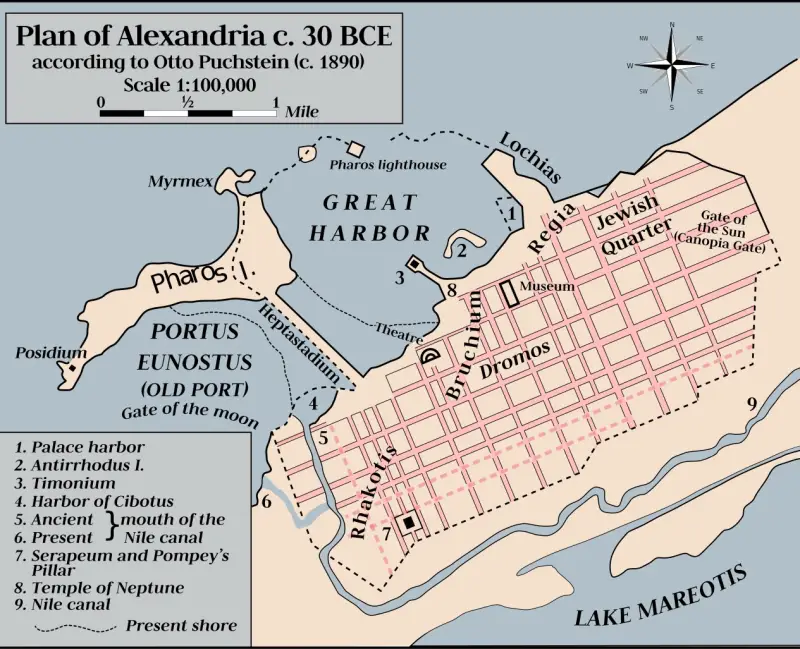
However, Bruhe refused to station ships in Alexandria. He also did not go to Corfu, citing the long distance separating this island from the shores of Egypt. He made the dangerous decision to move 32 km from Alexandria and place ships in the wide (up to 30 km) Gulf of Abukir, into which the river Rosetta (Rashid, the left branch of the Nile Delta) flowed.
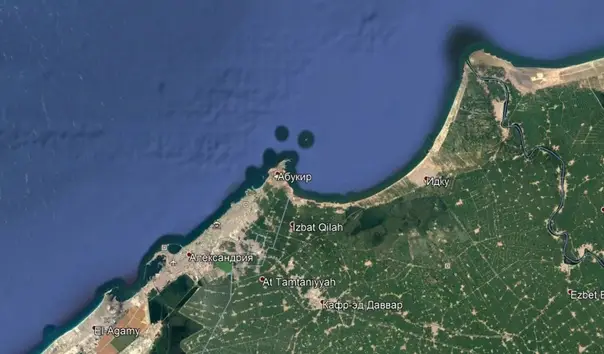
Abukir Bay, photo from space
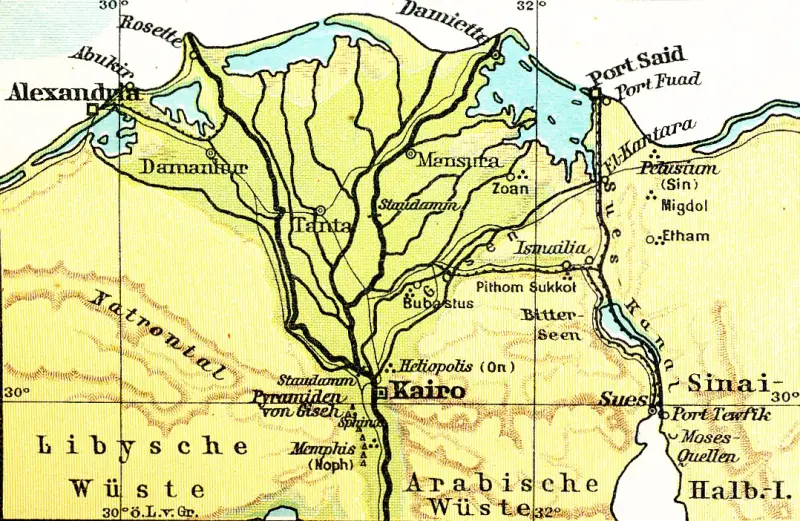
Nile Delta
On one side of the bay was the city of Abukir (previously called Kanop), which is now a suburb of Alexandria, on the other - Rashid (Rosetta).
В history Abukir was included as the site of three battles, the most famous of which, of course, is the naval one, which will be discussed in the article. But there were also land battles. In July 1799, the French defeated the Turks here, and in March 1801 they were defeated by the British.
In the bay there was a small island of the same name, where there was a fort with artillery batteries, and rocky shallows along the coast, which, it seemed, should have provided additional protection. But the British had the opportunity to attack the enemy fleet from the open sea.
In addition, having lined up the ships, Bruhe left too large a gap in front of the shoals on his left flank. The largest warships were positioned in the center and rear of the line. The French admiral, who knew that Nelson's squadron was already approaching Alexandria, for some reason decided that the British would not come here a second time. And therefore he did not even send small ships to carry out sea patrol on the approaches to Abukir.
Meanwhile, Admiral Jarvis decided to reinforce Nelson's squadron with the 38-gun frigate Seahorse, which, en route to Sicily on June 26, discovered and attacked the French 36-gun frigate Sensible. This ship was returning to France from Malta, it carried sick soldiers and part of the treasures from the Hospitaller treasury. The British captured this ship and learned the direction of movement of the enemy fleet.
The frigates Seahorse and Terpsichore went to Alexandria, where, as their captains believed, Nelson was supposed to be. On July 21, they discovered the French fleet and did not find a single English ship. After which they again went in search of Nelson - now to Sicily. They returned to Alexandria only on August 17 - 16 days after the Battle of Abukir.
Nelson was at that time off the coast of Morea (Greece). On July 28, he entered the Peloponnesian port of Koroni, where he learned from the Turkish governor that the last time the French fleet was seen south of the island of Crete. After this, he decided to go again to the shores of Egypt. He approached Alexandria on the morning of August 1, but did not see the French ships in the harbor. The battleships “Zileous” (Zealous – “Zealous”) and “Goliath” were sent to search for the enemy fleet; the first of them was lucky: at about half past two he discovered French ships anchored in Abukir Bay.
Nelson, at this time, on board his flagship, the battleship Avangard, dined with the captains of other ships, who would sometimes later be called “Nelson’s gang of brothers.” Having received the news from Ziles, he raised his glass, declaring that tomorrow he would go either to the House of Lords or to Westminster Abbey - that is, he would be buried next to other heroes of England.
In the next article we will continue our story and talk about the naval battle of Abukir, after which the Egyptian campaign, which began so brilliantly and promisingly, despite all the efforts of Bonaparte, turned into a miserable adventure that ended in the inglorious defeat of the French army abandoned by Napoleon.
Information